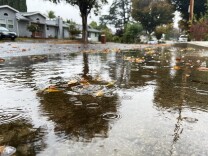
Next Up:
0:00
0:00
-
Listen Listen
Climate & Environment
The report concludes that the water supply was too slow, not too low, and even a functioning reservoir likely wouldn’t have stopped the Palisades Fire.
Listen
0:42
Sponsored message
More Stories
-
The L.A. fires have left many domestic workers and day laborers jobless. They may soon be hired for wildfire cleanup work, which has its own risks.
-
We haven't had rain since May. It’s a sign of how human-caused climate change is making Southern California weather more extreme.
-
Embers, then radiant heat, then direct flames are responsible for most houses burning down in wildfires.
-
Here are some common mistakes or misconceptions you may run into.
-
Catastrophic wildfires are common in California, and mental health specialists have become a key part of local governments’ response to extreme weather events, which scientists say are becoming more intense and frequent due to climate change.
-
Los trabajadores domésticos -niñeras, jardineros, asistentes para personas mayores- son una parte enorme de la economía de la región.
-
With more wind on the way, ash cleanup likely won’t be a one-time thing.
-
Pro-Kremlin social media accounts and outlets have been spreading a baseless narrative that mansions belonging to Ukrainian officials burned down in Los Angeles.
-
Most residents of middle-class Altadena could get fire insurance, but that is likely to change as residents rebuild and face price hikes.
-
Air quality experts and advocates warn of the potential dangers of smoke, ash and soot.
-
Los Angeles has wildfire policies that are far tougher than many of those in Western states. The destruction from the recent fires shows there are still major gaps to address.
-
Kate Dargan Marquis of the Moore Foundation discusses spurring research and development to keep up with the growing impact of wildfires.
Philanthropic funds helped purchase a burned lot that used to have 14 rental units. Supporters hope the project can be a model for rebuilding equitably for renters.
Listen
0:42
Support your source for local news!
In case you missed it
-
911 recordings obtained by LAist shed light on why and how emergency planning continues to leave people with disabilities behind.
-
LAist investigates illicit dumping at three Antelope Valley sites.
-
An LAist investigation found toxic heavy metals in samples of fire retardant collected from the Palisades, Eaton and Franklin fires. Here's what that means.
More Stories
-
Two portions of the forest will remain closed for safety concerns and so the landscape can recover after the recent wildfires.
-
Customers are picking up the $1.7 billion tab after the utility’s equipment was linked to the wildfire and resulting flooding seven years ago.
-
Social and environmental groups claimed the project could cause water and air problems not disclosed in an environmental impact report.
-
L.A. had planned to take substantially less from the iconic Eastern Sierra lake this winter. The decision is a blow to conservationists who have been trying to restore the lake for decades.
-
Forecasted rainfall rates don't look like they'll be high enough to trigger debris flows in recently burned areas.
-
Researchers contributing to the ASCENT network of air quality sensors observed spikes in lead and chlorine downwind from the Eaton Fire — and their measurements are now publicly available.
-
Phase 2 of the clean up, which is optional, has started, ushering in a new chapter in what is sure to be a long road to recovery.
-
Extreme conditions helped drive the fast-moving fires that destroyed thousands of homes in the Pacific Palisades and Altadena.
-
An Assembly bill by John Harabedian aims to speed up housing recovery after the L.A. fires through a state-led task force.
-
Big Bear’s internet-famous bald eagle couple are getting another shot at parenthood.




































